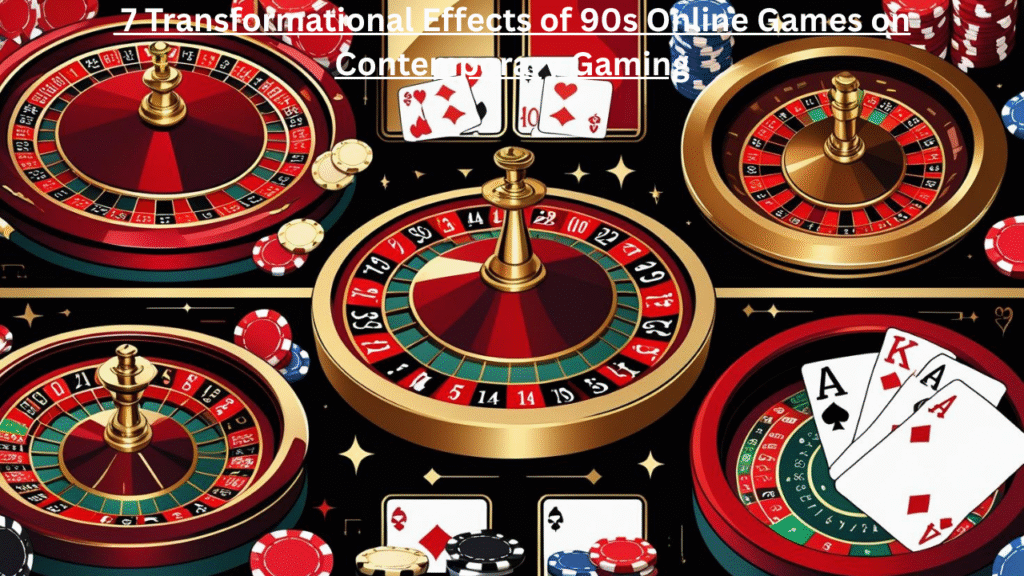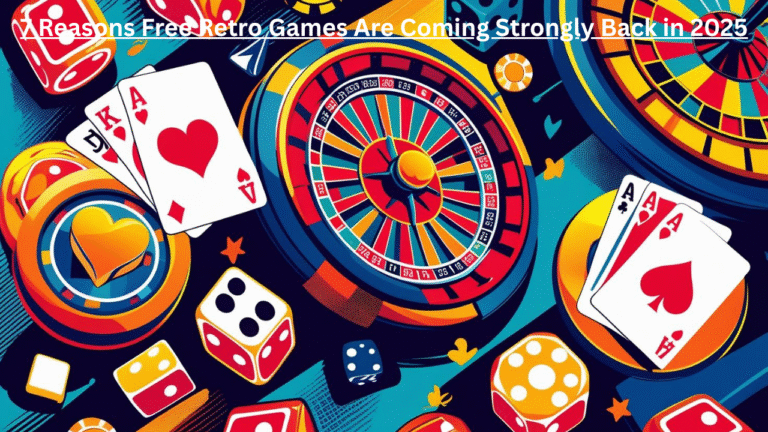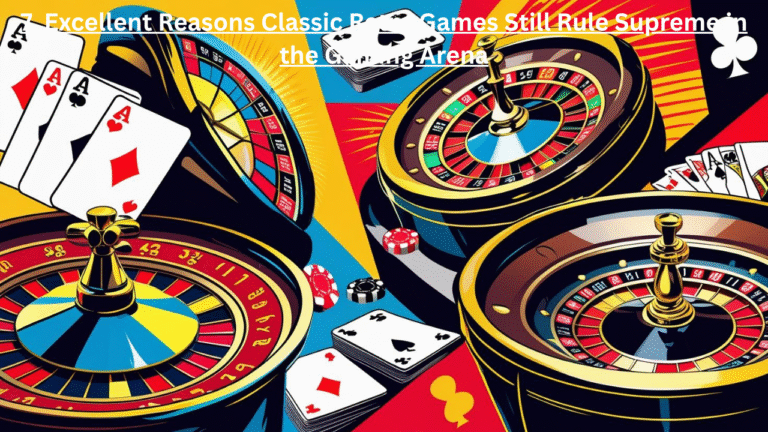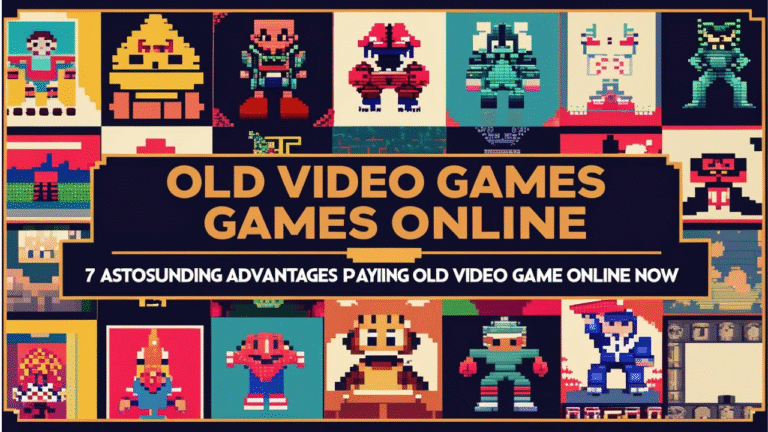Introduction: Generation’s Digital Nostalgia Formed
In the history of online gaming, the 1990s represent a golden age—a decade that not only witnessed the emergence of multiplayer computer adventures but also of the virtual communities and competitive settings we know today. For many, 90s online games were more than just pixelated distractions; they were formative experiences rewriting the laws of social connection, intellectual engagement, and future technologies.

We will investigate the history, influence, and legacy of 90s online games on this site. From the emergence of innovative platforms to the psychological and cultural changes they set off, this work acts as an authoritative look at how these digital pioneers prepared the path for contemporary gaming and beyond.
The terrain of 1990s online gaming

Online gaming evolved from a niche hobby to a major worldwide phenomenon in the 1990s. The emergence of the internet and dial-up access created new possibilities connecting users spanning continents and cities. Unlike today’s high-fidelity environments, 90s games relied on imagination, strategy, and interactive narrative given limited technical capability.
Of them, chief among them are:
- First-person shooter Quake (1996) became well-known for online multiplayer deathmatches.
- With its enduring online worlds, Ultima Online (1997) set the benchmark for the MMORPG category.
- Diablo (1996) offered cooperative online multiplayer together with hack-and-slash action.
- StarCraft (1998) with its online competitive play transformed real-time strategy games.
- Runescape (Beta in 1999) was a web RPG defining browser gaming.
These games were experiences calling players to collaborate, challenge each other, and grow together in real time, not just entertainment.
7 Transformational Effects of 90s Online Games on Contemporary Gaming
1. Online Multiplayer Ecosystems’ Foundation
Structured multiplayer models pioneered by 90 arcade games like Quake and Counter-Strike Beta (late 1990s) will finally develop into worldwide eSports leagues. Their normalizing of the concept of online competition helped Twitch, Steam, and competitive games like Valorant and League of Legends to flourish.
2. Overview of In-Game Economies
Trade systems and monetary mechanics developed by Ultima Online and EverQuest simulated actual economies. These prepare the ground for the modern crypto-based 1990s video games systems as well as the economics found in MMMs.
3. Social Engagement via Gaming
Early forebarers of modern Discord servers and voice channels were the chat systems found in 90s games download like Run Escape. Online games from the 1990s invented the idea of creating communities, rivals, and friendships all inside a virtual world.
4. Storytelling From Player-Centric Perspective
90s games allowed users to co-create tales, unlike passive viewers on TV. Games like Baldur’s Gate and Planescape: Torment had intricate narratives that varied according on the decisions the players made—something we modernly improve with AI-driven narrative and dynamic plot modification.
5. Technical Innovation Restrained
Engineers were pushed to maximize bandwidth and memory limits; the subsequent developments in coding, latency minimization, and best good old games design provide a basis for current mobile-first and cloud-based gaming paradigms.
6. Modding in Open Communities Arrival
With fans creating unique maps, game modes, and even entire games, games as Doom and Warcraft III set off the modding revolution. This resulted in the development of games like Dota and Counter-Strike, which began as mods before finally rising to be independent brands.
7. Retrogam Culture and Digital Preservation

The 90s produced a game preservation culture. The audience of emulating, virtual libraries, and remastered versions in the current period is different. This retrogaming phenomena is a flourishing sub-market for publishers and developers both, not only a nostalgia.
Steps: How to Re-connect with Online Games from the 90s Right Now
Stage 1: List the genres you enjoy.
You run strategy, FPS, or role-playing? Keep your focus limited to find great 90s masterpieces.
Second: Choose a Retrogaming Platform.
Make use of trustworthy sites including the classic library Steam, GOG (Good Old Games), or emulator programs DOSBox and ScummVM.
Third step: apply modern mods and patches.
Many classic games have community-made patches addressing flaws, using widescreen capability, and improving performance on modern systems.
Fourth: Engage in online communities.
For retro gamers, Reddit threads, Discord servers, and specialty forums still offer competitions, conversations, and guides.
Step five: Act sensibly.
Unlike present mobile games, which provide quick pleasure, 90s games demand patience, strategy, and perseverance. Expect realistically and play for experience instead of perfection.
FAQs Regarding Online Games from the 90s
Q1: Are they playable right now?
Indeed, remastered versions, emulators, and internet game stores let most 90s titles be accessed. Some even have fans run operational online servers.
Q2: Why did 90s online games have such impact?
Their impact is innovation—showcasing virtual economies, multiplayer games, and persistent storytelling when such ideas were fresh and novel.
Q3: Are 90s online games playable for current gamers?
Surely. Though the graphics and mechanics seem antiquated, the gameplay and narrative itself frequently exceed most modern games in complexity and difficulty.
Q4: Can one safely download and run these games?
Indeed, given they come from reliable sources like GOG, Steam, or official fan remasters. Avoid cracked or pirated copies with possible viruses.
Q5: Playing 90s online games has educational worth?
Yes. Strategic thinking, problem-solving, and computer literacy all get better from these games. They also provide historical background on the change of user experience and game design.
Final Thought: Why Legacy Still Counts
Online gaming in the 1990s was a reset of culture rather than a passing trend in the evolution of technologies. It merged young internet technology with fun in ways that affected our socializing, interacting, and media consumption today. Its impact goes well beyond entertainment; it shapes social media, e-commerce, education, even blockchain gaming.
The main design ideas of the 1990s are more relevant than ever as we enter an era governed by artificial intelligence, the virtual world, and metaverse thinking: creativity above graphics, community above algorithms, and experience over monetizing.
Finally, a timeless experience that inspires still today.
Though nimbus they may be of the past, 90s online games are not relics; rather, they are ageless masterpieces that formed a multi-billion dollar sector. For those who lived it, there is longing. Newcomers will find deep, immersive, and meaningful gameplay not possible with current releases.

Reviewing these classics is more than just a trip down memory lane—it’s an education in invention, resilience, and the limitless possibilities of digital play regardless of your level of gaming experience or curiosity about the roots of online multiplayer.



